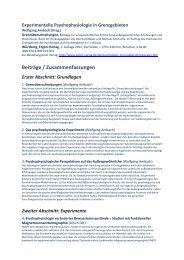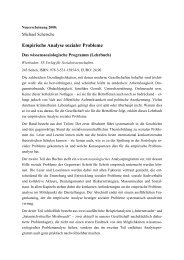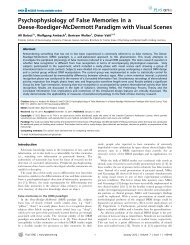Tätigkeitsbericht 2002/2003 - IGPP
Tätigkeitsbericht 2002/2003 - IGPP
Tätigkeitsbericht 2002/2003 - IGPP
Erfolgreiche ePaper selbst erstellen
Machen Sie aus Ihren PDF Publikationen ein blätterbares Flipbook mit unserer einzigartigen Google optimierten e-Paper Software.
Cultural Studies and Social Research 41<br />
(c) positive oder negative Bewertungen erfahren. Im<br />
Mittelpunkt der Untersuchung sollen die den existenziellen<br />
Schock auslösenden Erfahrungen oder Erinnerungen,<br />
die individuellen wie sozialen Parameter des<br />
Transformationsprozesses sowie dessen biographische<br />
und soziale Folgen stehen.<br />
Auf Basis der Ergebnisse der durchgeführten Pilotstudie<br />
wird ab Februar 2004 die Hauptuntersuchung in<br />
Form eines durch Stipendium geförderten psychologischen<br />
Promotionsprojekts durchgeführt.<br />
Mayer, Schetsche<br />
Projekt G2: Besessenheit und Bewusstseinskontrolle<br />
(Pilotstudie)<br />
Gegenstand der Untersuchung waren zwei Vorstellungen,<br />
die auf den ersten Blick nicht viel gemein zu haben<br />
scheinen: die religiös motivierte Idee von der Besessenheit<br />
von Menschen durch böse Geister oder Dämonen<br />
und die säkular begründete Idee von der psychotechnischen<br />
Kontrolle des Bewusstseins von Individuen. Die<br />
als Pilotprojekt durchgeführte Literaturstudie zeigte<br />
jedoch, dass beide Vorstellungen eine gemeinsame,<br />
emotional stark besetzte Grundüberzeugung eint: die<br />
Annahme, dass vollständige Fremdkontrolle des Subjekts<br />
durch einen (menschlichen bzw. nichtmenschlichen)<br />
Akteur nicht nur möglich ist, sondern dass diese<br />
in der Realität zumindest in Einzelfällen auch stattfindet.<br />
Es wurde außerdem festgestellt, dass beide<br />
Ideen in historischer Perspektive diskursiv und organisatorisch<br />
verknüpft sind – und zwar über die Entstehung<br />
der modernen Psychologie.<br />
Fazit des Abschlussberichts der Pilotstudie: Vorgeschlagen<br />
wird die Durchführungen einer diskursanalytischen<br />
Studie, die gemeinsame und separate<br />
Merkmale der Diskurse über Besessenheit und Bewusstseinskontrolle<br />
auf fünf Ebenen zu untersuchen<br />
hätte: (1) die Konzeptionen und ihre subsummierten<br />
phänomenalen Erscheinungsformen, (2) ihre gesellschaftliche<br />
Verbreitung und Bewertung und dazu verwendete<br />
Mittel, (3) die beteiligten Akteure, (4) die<br />
rhetorisch-stilistischen Darstellungsformen sowie (5)<br />
die materialen Diskurspraktiken.<br />
Es ist noch nicht entschieden, zu welchem Zeitpunkt<br />
und in welcher Form das Hauptprojekt durchgeführt<br />
wird.<br />
Temme, Schetsche, Schmied-Knittel<br />
Projekt G3: Magische und okkulte Praktiken in der<br />
verwissenschaftlichten Welt (Pilotstudie)<br />
Auch in Kulturen, deren Diskurse und Handlungspraxen<br />
sich an naturwissenschaftlichen Rationalitätsmodellen<br />
orientieren, lassen sich empirisch<br />
magische Vorstellungen und entsprechende Praktiken<br />
nachweisen. In Ländern wie der Bundesrepublik ist<br />
dabei zunächst an die unterschiedlichsten Formen der<br />
“Alltagsmagie” zu denken, die zwar wissenschaftlich<br />
regelmäßig als “abergläubisch” kritisiert werden, in der<br />
and memories causing the existential shock as well as<br />
the individual and social parameters of this process<br />
of transformation and it’s biographical and social<br />
consequences.<br />
Starting in February 2004 the main study will be conducted<br />
on the basis of the results of the pilot study. It<br />
will be done in the context of a scholarship for a doctor<br />
thesis in psychology.<br />
Mayer, Schetsche<br />
Project G2:<br />
Study)<br />
Possession and Mind Control (Pilot<br />
This study is about two concepts which do not seem<br />
to be related at first glance: The religiously motivated<br />
concept of possession of human beings by evil ghosts<br />
or demons and the secular concept of mind control<br />
of individuals. However, the pilot study – based on<br />
an analysis of literature – showed that both concepts<br />
share one very emotional basic belief: the assumption<br />
that complete external control by a (human or nonhuman)<br />
actor is not only possible, but also – at least in<br />
individual cases – really takes place. Furthermore, out<br />
of a historical perspective both concepts are linked<br />
through discourse and organization, namely by the<br />
rise of modern psychology.<br />
Conclusion of the final report of the pilot study: We<br />
propose a discourse-analysis which investigates common<br />
and individual characteristics of the discourses<br />
of possession and mind control on five levels: (1) the<br />
conceptions and their phenomenal manifestations,<br />
(2) their social proliferation and appraisal including<br />
the means employed, (3) the actors involved in the<br />
discourse, (4) the stylistic and rhetorical forms of<br />
presentation and (5) the practices of discourse.<br />
It has not been decided yet at what time and in which<br />
form the main project will be realized.<br />
Temme, Schetsche, Schmied-Knittel<br />
Project G3: Magic and Occult Practices in a World<br />
More and More Formed by Science<br />
Even in cultures whose discourses and practices are<br />
orientated on scientific models of rationality empiric<br />
magical beliefs and practices are to be found. First of<br />
all, in countries such as the Federal Republic of Germany<br />
one has to think of different kinds of “everyday<br />
magic”, which on the one hand are regularly criticized<br />
as superstition by the scientific community but on the<br />
other hand are widespread and socially accepted in


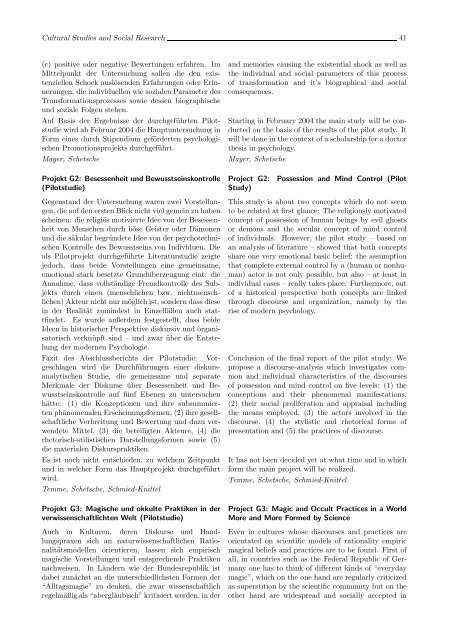
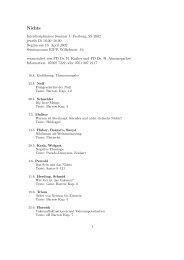
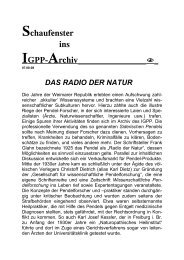
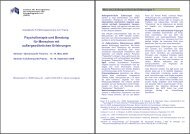
![Findliste Nachträge1 [pdf] - IGPP](https://img.yumpu.com/22552359/1/184x260/findliste-nachtrage1-pdf-igpp.jpg?quality=85)
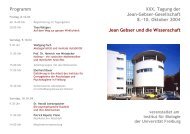
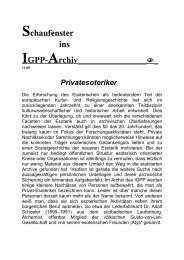
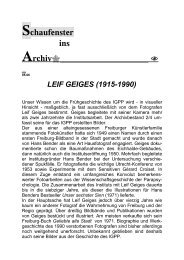
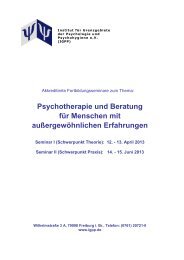
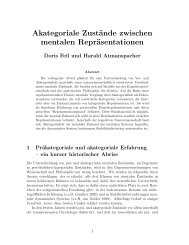
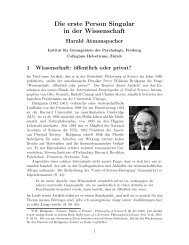
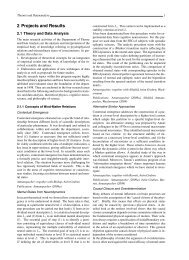
![Findliste [pdf] - IGPP](https://img.yumpu.com/22552265/1/190x245/findliste-pdf-igpp.jpg?quality=85)
